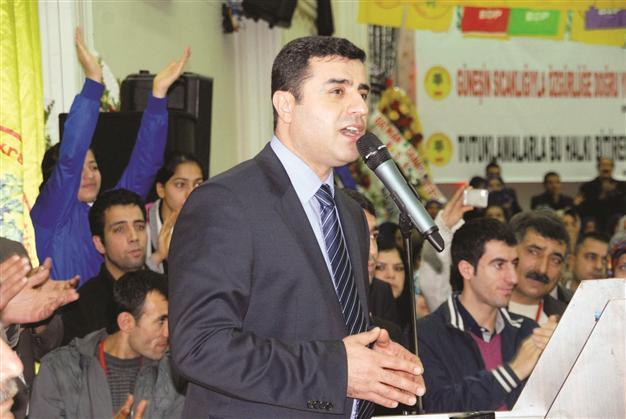EU set to put Kurdish issue higher on agenda
ANKARA / BRUSSELS

The Peace and Democracy Party (BDP) announces that its co-leader Selahattin
Demirtaş will be in Strasbourg to participate in the debate on Kurdish issue. DHA photo
A recent initiative by the Turkish government, the final aim of which is the disarmament of the outlawed Kurdistan Workers’ Party (PKK), will be the key topic of a debate tomorrow at the European Parliament in Strasbourg.
“MEPs will quiz the council and the commission on Wednesday on how the EU can better [help ensure] a peaceful solution to the Kurdish issue in Turkey,” the European Parliament said in an announcement on its website.
In Ankara, Peace and Democracy Party (BDP) announced that its co-leader Selahattin Demirtaş would be in Strasbourg today and tomorrow to participate in the same debate.
The Turkish government recently launched the initiative – dubbed the “resolution process,” “peace process,” or “İmralı process,” – with jailed PKK leader Abdullah Öcalan to effect the ultimate disarmament of the PKK. In late December 2012, Prime Minister Recep Tayyip Erdoğan revealed that intelligence officials were holding talks with Öcalan to convince PKK militants to lay down their arms and withdraw from Turkish soil. On Jan. 3, Ahmet Türk – head of the Kurdish umbrella organization the Democratic Society Congress (DTK) and an independent lawmaker – and the BDP’s Ayla Akat were allowed to visit Öcalan as part of the process.
Since then, a second parliamentary visit is expected to be paid to Öcalan, with BDP executives saying they had yet to receive any negative or positive response from the Justice Ministry on their application.
EU officials have mostly been silent on the process.
“The European Parliament is observing the newly started peace process in Turkey and welcomes the initiative,” Jürgen Klute, a member of the Confederal Group of the European United Left - Nordic Green Left in the European Parliament, told the Hürriyet Daily News on the phone yesterday.
“Since the EU is not a conflict party, it is able to offer further support and monitoring, as well as mediation, if requested."
Klute,a member of Germany’s Die Linke (The Left), said the negotiations should continue and that the process should include all sides, including the PKK.
“We encourage parties to come to [roundtable] talks and encourage them to stop violence, especially against civilians,” the MEP said. “In order to come to a political solution, a method that can build trust and confidence is needed at this crucial moment. Both sides must agree on the way forward, the agenda for negotiations and parties to be included."
Alexander Graf Lambsdorff of the Group of the Alliance of Liberals and Democrats for Europe told the Daily News that there was a wider interest in the EU in the Kurdish issue for a number of reasons.
“First of all; it is the Turkish authority that is engaged in the issue in a way that many didn’t expect,” Lambsdorff said in a telephone interview yesterday. “Therefore, there is hope that there may be some rapprochement and a constructive dialogue and perhaps some form of accommodation of the Kurdish requests. The second reason for more interest is the extremely high number of arrests in the KCK [Kurdistan Communities Union, the alleged urban wing of the outlawed Kurdistan Workers’ Party – PKK] case. That has raised many questions in Europe about what is really going on concerning the Kurdish minority since it seems to contradict the dialogue with Mr. Öcalan.”
The third reason for the increased interest is the situation in Syria and the developments in northern Iraq, he added.
“The geopolitical context is also changing and the Kurdish question is taking on a strategic dimension because of what is going on in Arbil and the mountains of Syria; this is difficult for Ankara,” Lambsdorff said.
The high degree of militants’ violence is another reason, the member of European Parliament added.
“Turkish soldiers are dying every day in the southeast and this is something which many in Europe do not realize,” Lambsdorff said, noting that the fifth and last reason for wider interest was the “mystery of the Paris killings” of three female PKK members, which took place Jan. 9, only days after a critical development in “the peace process.”
BDP co-chair Demirtaş will also participate in an open meeting on the same issue today.
Lambsdorff, Helene Flautre of the Group of the Greens and co-chair of the EU-Turkey Joint Parliamentary Committee, Richard Howitt of the Group of the Progressive Alliance of Socialists and Democrats, as well as Klute, will be the other participants in the meeting, the BDP said.
Tomorrow’s debate is expected to be opened by an official statement from Commissioner Stefan Füle on behalf of the European Commission, followed by another official statement of the Irish Presidency of the EU Council, according to news reports close to Kurdish groups based in Europe.
